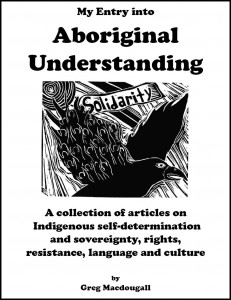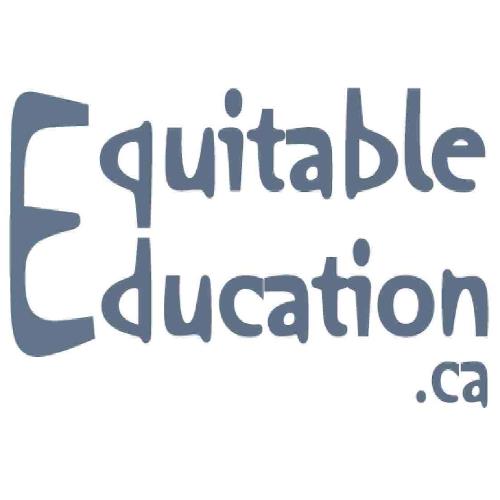
A collection of articles on Indigenous self-determination and sovereignty, rights, resistance, language and culture. In two PDF versions (for either front-to-back reading, or formatted to print doublesided and fold into booklet form). Please share.
When I was living in Kitchener-Waterloo, I had the opportunity to attend and be involved in different things that opened my eyes to ‘Aboriginal Awareness’ (the name of a conference from which come a couple of the articles in this booklet).
This booklet is a collection of writings that cover some of the learnings from that time. As part of IPSMO (Indigenous Peoples Solidarity Movement Ottawa), and with support from CUPW (Canadian Union of Postal Workers), I’ve been able to get a few hundred of these booklets into peoples’ hands without having to ask for money in exchange.
Now, I’m also making this booklet available online. The intent is to allow people — who’d like to perhaps gain some new perspective, to perhaps find a way to become more in alignment with some of the teachings contained within — to read the booklet online, or print off their own copy(s).
Testimonials
I was honoured to receive this (somewhat shorthand) email from Romola Trebilcock, long-time aide and assistant to Algonquin Elder Grandfather William Commanda:
“Thank you very much for sharing your booklet with us … When GWC look at it he said it was good to see someone could understand how he thinks.”
It is with great sadness but also a gratitude for all that he brought to the world, that I write here that he has recently passed on. If this booklet can help people understand some of the kinds of values or thinking that Grandfather approached life with, I would love to be able to help it reach as many people as possible.
I think the content it contains is a good way for people with an interest in activism to learn more about Aboriginal culture, and conversely it’s an entry point into activism for people with an interest in the culture.
Also, I received secondhand feedback that someone said she felt that this booklet would be really valuable to get into the school system. (So, if you know someone who works in schools, who might be able to use this in the classroom, please do pass this on).
DOWNLOAD THE BOOKLET
There are two versions, both printable, but only the first suitable for reading from your computer:
- Click here for the e-book (aka front-to-back formatting) (Right-click and ‘Save link as…’ to download)
- Click here for the version formatted for printing doublesided and folding into a booklet/zine(Right-click and ‘Save link as…’ to download)
Table of contents – 32 pages (5.5″ x 8.5″) = 16 standard 8.5″x11″ pages (or 8 doublesided)
Cover image by Tania Willard ~ Intro ~ Burnt Church ~ Ward Churchill (article and interview) ~ Violet Shawanda: keeper of the language ~ James Bartelman ~ Aboriginal Awareness conference ~ Shannon Thunderbird ~ Herb Joseph ~ Wolverine ~ Spirit Connections ~ Outro
Future plans
I’m planning to update the booklet with some more writings and also feature some videos I’ve made available online – and maybe look more at how to publish it and work on distributing it in the school system. When the ‘2nd edition’ comes out, I will likely take the original version down.
So please do take the opportunity while it’s up to take a look, and consider if you know others who might like to see this (there’s a ‘social media sharing bar’ below, or just send an email with the link to this page/website). If you (or an organization you’re part of) would like to print multiple copes for distribution, please do.
To receive notice of the 2nd edition coming out, please sign up for updates in the update form on the right hand sidebar (near the top) – or feel free to contact me via email form
And if you have any comments/feedback, please don’t hesitate to leave them below. And please do consider sharing this with others (there’s a ‘social media sharing bar’ below as well)
Preview of some content for the 2nd edition:
- Indigenous Sovereignty Week builds community based resistance
- ‘Saving the Land, Saving History‘ – regarding the Beaver Pond Forest / South March Highlands (and featuring quote from Grandfather Commanda)
- (video) – Algonquins of Barriere Lake: Fight for Self-Determination and Environmental Protection
- (video) – Breaking Cycles: Tanya Tagaq at Women’s Worlds 2011 plenary (incl. singing)
 Interdependent media & in-person learning opportunities for those who are inspired to be part of movements for social justice.
Interdependent media & in-person learning opportunities for those who are inspired to be part of movements for social justice.
Some excerpts from the booklet:
“In 1988, Bernard Nicheman did a global survey of armed conflicts … he cataloged 125 wars that were ongoing on the planet at the time, and of those, 85 per cent … were between indigenous peoples and one or more nation states that presumed to have an overarching sovereign authority. It is saying, basically, ‘Bullshit – now, you can back off this way or you can back off that way, but basically we’re going to assert our right to self-determination like any other peoples are entitled to, as codified in the United Nations charter and innumerable elements of international law, and if you don’t like it you’re going to have to fight us about it.'”
– interview w/ Ward Churchill
In anishnaabe there is power and sacredness of words. All people are considered equal. The language and culture cannot be separated.
Basil Johnston says language is the key for ideas and aspirations.
It reflects freedom, generosity, sharing, admiration for
resourcefulness, talent, imagination, respect for mystery, and
spirituality -> gzhe-mnidoo, which represents the great mystery.
The seven grandfathers (something like the ten commandments):
wisdom -> to cherish knowledge is to know wisdom
love -> to know love is to know peace
respect -> to know all of creation is to have respect
bravery -> is to face the foe with integrity
honesty -> in facing a situation is to be brave
humility -> is to know yourself as a sacred part of creation
truth -> is to know all of these things
– teachings of Violet Shawanda, keeper of the language (Ojibwe / Anishnaabe)
She talked about how there’s this balance, where people in a society have different roles, that they’re good at, and how everyone doing what they do best is in the best interests of the society.
She described the buffalo hunt. First, it is the role of the spirit doctor (not the Asian name ‘shaman’, she says she hopes no one still believes in the Bering Strait theory, none of the elders’ stories talks of coming over the Bering Strait) .. it is the role of the spirit doctor to go into transcendental state, to see it is time. Then it is the turn of the buffalo caller (also a spirit doctor), who prays and calls the buffalo to come to the hunters. The buffalo (tatanka) spirits are happy to offer themselves to the hunters if they will take only what they need, use everything, and waste nothing – if they will honour the buffalo. Calling the buffalo will lead to hearing a rumble on the horizon.
– teachings of Shannon Thunderbird
It is important that we all work together, collectively, different aboriginal peoples working together, and aboriginal and nonaboriginal peoples working together. It was noted that something that is often not mentioned is how the support of non-native people has been very important in the struggle for native rights and way of life.
We have to realize that the government, through repressing and taking away native culture, has been committing the soft manner of genocide, not as blatant as shooting or gassing, but equally as effective in killing a culture.
– teachings of Herb Joseph
Nice job. Anishashin. I am from the Lake Superior Ojibwe, in the land that falls on the other side of the arbitrary divsion that defines us as either Canadian or American. You have thoughtful collection here and stayed true to the voice. I will share. My grandmother always said to spread good around. With more light, more is illuminated, shadows emerge and can be addressed. Chii Miigwetch